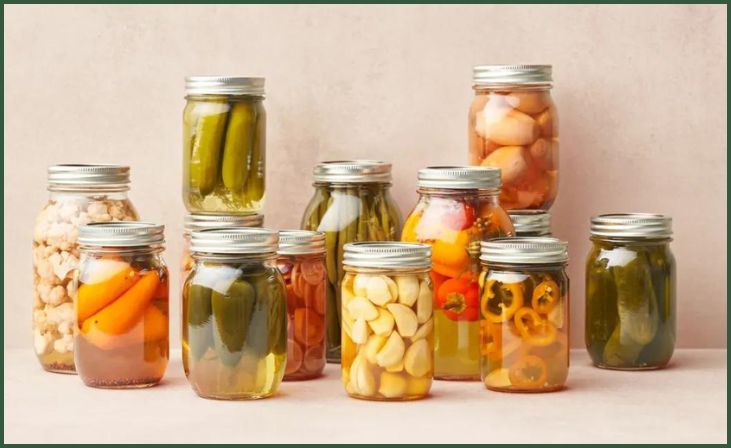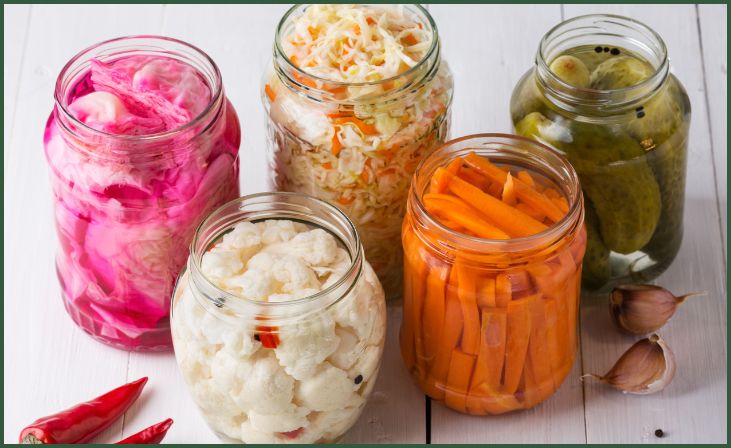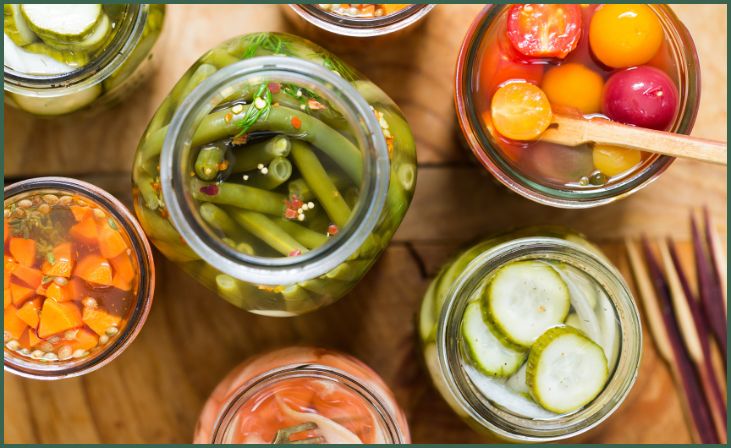Fermented foods have gained immense popularity in recent years for their potential health benefits. However, there are several myths surrounding these tangy, gut-friendly treats. In this article, we’ll delve into 9 common myths about fermented foods, debunking myths and shedding light on their true value. Let’s unravel the truth and discover why these foods deserve a place in your diet.
Table of Contents
Toggle9 Fermented Food Myths Debunked
Unveiling the truth behind these common myths about fermented foods.
Myth 1: Fermented Foods are Spoiled

The belief that fermented foods are spoiled is a myth. Fermentation is a controlled process where beneficial microorganisms transform raw ingredients into foods like yogurt, kimchi, and sauerkraut. These foods undergo changes that enhance flavor, nutrition, and preservation. Unlike spoilage, which involves harmful bacteria, fermentation involves safe, intentional bacteria that promote health. So, fermented foods are not spoiled; they’re delicious and beneficial. This is first myth about fermented food on our list of 9 Myths About Fermented Foods.
Myth 2: Fermented Foods Always Taste Sour
The notion that all fermented foods taste sour is a myth. While some do have a tangy flavor due to the production of acids during fermentation, not all fermented foods share this characteristic. Fermentation can produce a wide range of flavors and textures, from the earthy umami of miso to the complex notes of aged cheese. The variety of fermented foods means that their taste profiles are diverse and not limited to sourness.
Also Read: Salts for Fermenting Foods
Myth 3: Fermented Foods are High in Alcohol
The belief that fermented foods are high in alcohol is a myth. While fermentation involves the conversion of sugars into various compounds, including alcohol, the levels produced in most common fermented foods are negligible and well below intoxicating levels. Fermented foods like yogurt, sauerkraut, and kefir typically contain only trace amounts of alcohol, making them safe and suitable for consumption by people of all ages, including children and those avoiding alcohol.
Myth 4: Fermented Foods Replace Probiotic Supplements
Considering fermented foods as a complete replacement for probiotic supplements is a myth. While fermented foods like yogurt and kimchi contain live beneficial microorganisms, their probiotic content can vary and might not provide specific strains or concentrations required for certain health benefits. Probiotic supplements, on the other hand, can be tailored to deliver specific strains and quantities, making them more reliable for targeted health goals. Both fermented foods and supplements can complement each other for overall gut health.
Myth 5: Fermented Foods are Unsanitary

Labeling fermented foods as unsanitary is a myth. In controlled fermentation, beneficial microorganisms outcompete harmful ones, creating an inhospitable environment for pathogens. Natural preservation methods, like lactic acid production, make these foods safe to eat. Common fermented foods like cheese, yogurt, and pickles have a long history of safe consumption. Proper hygiene and regulated processes contribute to the safety and quality of these nourishing foods.
Don't just scroll, subscribe!
BuzzTrail's unique web-stories are the cure for boredom you've been waiting for.
Myth 6: Fermented Foods are Only for Vegans
The idea that fermented foods are exclusive to vegans is a myth. Fermented foods like yogurt, kefir, and various cheeses are enjoyed by people of different dietary preferences, including non-vegans. Fermentation enhances flavor, texture, and nutritional value in diverse foods, appealing to a wide range of tastes and diets. Whether vegan or not, anyone can appreciate the benefits and deliciousness of fermented foods as part of a balanced diet.
Also Read: Can You Ferment Different Foods in the Same Room?
Myth 7: Fermented Foods Cause Food Poisoning
Attributing food poisoning solely to fermented foods is a myth. Properly fermented foods undergo controlled processes that create an environment unfavorable for harmful bacteria. The natural acids and compounds formed during fermentation act as preservatives. Cases of food poisoning are usually linked to mishandling, unsanitary conditions, or improper fermentation. When prepared and stored correctly, fermented foods are generally safe to eat and can contribute to gut health and overall well-being.
Myth 8: Fermented Foods are Difficult to Make at Home
Considering fermented foods as challenging to make at home is a myth. Many fermented foods, such as yogurt, sauerkraut, and sourdough bread, can be easily prepared with basic ingredients and simple steps. While some variations require specific techniques, there are numerous beginner-friendly recipes available. With proper guidance and a bit of patience, crafting your own delicious and nutritious fermented foods can be an accessible and rewarding culinary adventure.
Myth 9: All Fermented Foods are the Same

Treating all fermented foods as identical is a myth. Fermentation involves diverse microorganisms and processes that yield a wide range of flavors, textures, and nutritional profiles. From the tangy notes of yogurt to the complex umami of miso, each food type undergoes distinct transformations. These variations offer a rich selection of tastes and health benefits. Appreciating the unique qualities of different fermented foods enhances culinary experiences and dietary diversity. This is last myth about fermented food on our list of 9 Myths About Fermented Foods.
Also Read: Sterilize your Fermenting Jars
Conclusion (Myths About Fermented Foods)
Now that we’ve uncovered the truth behind these 9 common myths about fermented foods, you can confidently embrace the goodness they offer. From enhancing digestion to supporting your immune system, these probiotic-rich delicacies can be a valuable addition to your diet. Remember, a well-informed approach to fermented foods can lead to a happier and healthier you.
Frequently Asked Questions (FAQs)
Can fermented foods help with digestion?
Can fermented foods help with digestion?
Yes, fermented foods contain probiotics that can aid in digestion by promoting a healthy balance of gut bacteria.
Can fermented foods prevent food allergies?
Can fermented foods prevent food allergies?
There is some evidence suggesting that early exposure to fermented foods might reduce the risk of developing food allergies, but more research is needed.

